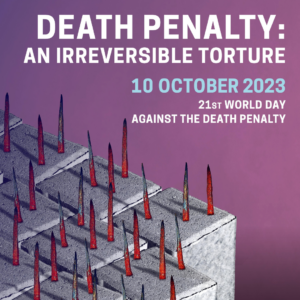
New term, new chance to reevaluate death penalty
- DPP in the Media
- 6 Jul 2019
Originally published in The Jakarta Post , 6 July 2019
By Parvais Jabbar and Ricky Gunawan
In the wake of President Joko “Jokowi” Widodo’s reelection, there is now room for renewed – and perhaps reinvigorated – discussion of Indonesia’s continued use of and reliance on capital punishment.
On his campaign trail, Jokowi suggested a shift in focus toward human development and expressed his own desire to “save as many lives as possible”. As Indonesia seeks to revise its Criminal Code – which is long overdue – the time is ripe for wider discussions on criminal justice, as well as the motivations for and the effects of having the death penalty.
The Death Penalty Project (DPP) returned to Indonesia in June with Prof. Carolyn Hoyle of the University of Oxford and Prof. Jeffrey Fagan of Columbia University, both experts on capital punishment. Working alongside the Community Legal Aid Institute (LBH Masyarakat), the University of Indonesia (UI) and Atma Jaya University, we are discussing the importance of independent academic research to provide accurate information on the death penalty in Indonesia.
The death penalty is in decline worldwide. Currently, 75 percent of the world’s nations have abolished the death penalty and just last year, legal executions fell 31 percent. Indonesia has imposed a moratorium on executions for almost three years, but according to an Amnesty International report, its courts sentenced at least 48 people to death in 2018, 39 for drug-related crimes.
In the Philippines, despite abolishing the death penalty in 2006, President Rodrigo Duterte’s anti-narcotics campaign has allegedly killed thousands. Sri Lanka recently announced a desire to resume executions after a 40-year moratorium, primarily for drug offenses, and Indonesia’s concerns of a “drug epidemic” have fuelled support for the death penalty. These indicate a broader punitive approach to drug trafficking and distribution across Southeast Asia.
Local demands to retain and use the death penalty in Indonesia appear to be rooted in two core beliefs: it is an effective deterrent and it is a popular policy.
Historically, capital punishment has been justified by generalizations about criminals and far-reaching drug networks that have not been rigorously tested in any Southeast Asian jurisdiction. It is often presumed that the death penalty can deter drug traffickers and drug mules. Yet, the fact that the kingpins often avoid detection while their precarious mules are subject to capital punishment suggests that the deterrence argument may be on shaky ground.
In Indonesia, drug crimes have not decreased significantly since President Jokowi carried out the first round of executions in January 2015. While this in itself does not prove that there has been no deterrent effect, it certainly does not support the deterrence rationale. Evidence from other jurisdictions show that the death penalty cannot be employed justly, without arbitrariness.
The second core belief is that the death penalty is widely supported by both key influencers and the public. In an interview with an international media outlet in 2017, Jokowi said he would consider a formal moratorium if there was clear public support.
Previous opinion polls indicate popular support for the death penalty; however, these polls were based on the simple framing of “for” and “against”. This approach fails to tease out the intricacies of individual views and responses to actual cases or types of cases. In Malaysia, a study by Oxford’s Roger Hood commissioned by the DPP showed that when presented with actual case scenarios for drug trafficking offenses, support for the death penalty fell from 80 percent to 29 percent among respondents. The figure fell even lower to just 26 percent when the risk of innocent persons being executed was explained to the respondents. Further, it was found that the respondents’ understanding was contingent on their familiarity with how the criminal justice system operates in practice, not least that all justice systems around the world were fallible. Facts that inform opinions, and the nuances of those opinions, should therefore be investigated carefully.
Responding to the current dearth of empirical evidence, DPP, LBH Masyarakat and our partners plan to study the deterrent effects of capital punishment on individual drug use, but also at the systemic level, looking at the nature of drug markets and their social impact on public health and crime rates. We also plan to investigate public attitudes and “opinion leaders”, including policymakers, through interviews to understand the extent of public knowledge of the issue, the degree of public support and the strength of their opinions.
In January 2019, we commissioned eight pilot interviews with key opinion leaders. Most respondents said that having more executions would not reduce the violent crime rate, and instead favored improved social policies like poverty reduction and better housing. In relation to drug-related offenses, these opinion leaders also prioritized better policing and education over greater enforcement of capital punishment. Such data would also have wider applicability for neighboring countries. Given the many foreign nationals on death row across Southeast Asia, this could also have implications for overseas Indonesian citizens. There is strong public support for the government to save Indonesian migrant workers who are facing the death penalty abroad, suggesting that the public is somewhat equivocal towards the death penalty. If provided with more knowledge about its administration and impact, the public would be better able to engage in informed debate.
Furthermore, whilst the death penalty remains a possible punishment, no executions have taken place for nearly three years. Some would argue that there has been a shift in Indonesia’s approach to drugs, reflected in both ongoing deliberations on alternative punishments and the efforts of the National Narcotics Agency (BNN), which has increasingly prioritized rehabilitative over harsh punishment in combating drugs. These shifts suggest that the government is growing increasingly aware of the inefficacy of the death penalty.
Conducting independent research on critical issues is one way to ensure proper understanding and to facilitate informed debate on the future of capital punishment. Only through dialogue and meaningful engagement can we strive to protect the innocent and seek to better understand how best to hold criminals to account.
Parvais Jabbar is co-executive director of The Death Penalty Project; Ricky Gunawan is director of LBH Masyarakat, a legal aid organisation based in Jakarta that provides free legal services for victims of human rights violations, including those facing the death penalty.



















